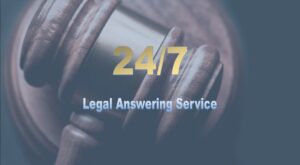Converting legal leads into opportunities is a major challenge for law firms. Marketing might generate plenty of leads, but only a small fraction typically become paying clients. In fact, the average consumer attorney converts just 5–15% of their leads (only 5–15 clients out of 100 leads) and one survey of new clients found it takes an average of 13.4 leads to produce a single new client. The rest of those prospects drop off, often due to inadequate qualification or follow-up during the intake process. This gap represents a huge opportunity: by improving lead qualification and intake, firms can increase conversion rates to 25–45% or more.
Below, we’ll explore what makes a lead “qualified” and important questions to ask during the intake process.
Why Effective Lead Qualification is Necessary
Law firm response rates to online leads rose to 73% in 2023 (up from 59% in 2021), yet roughly 27% of potential clients still get no reply from the firm they contact. Quick and thorough responses are critical and prospects will reach out to another firm if their call or message isn’t answered promptly.
Furthermore, studies show that speed-to-response is the single biggest factor in converting leads to clients. You are 100 times more likely to actually reach a prospect if you respond within 5 minutes and 21 times more likely to convert them versus waiting more than 30 minutes. Yet many firms struggle with slow follow-up. It’s not enough to simply respond quickly; how you handle the intake call or email also determines if the lead moves forward.
A legal industry survey found that clients expect certain basics in a firm’s reply: an adequate email response should arrive within 24 hours and answer the prospect’s questions, demonstrate the lawyer’s ability to help and outline next steps or consultation booking. Firms that provide this kind of informative response are far more likely to secure a consultation, directly impacting both intake conversion rate and revenue.
What Makes a Lead “Qualified” for Your Law Firm?
A qualified lead is a prospective client who fits your firm’s ideal client profile in terms of legal need, case type, budget, timing and other factors. In other words, it’s someone with a problem you handle, the ability/desire to hire an attorney and a case that meets any criteria your firm requires (such as severity of injury or jurisdiction). Determining this usually requires a brief intake conversation to verify the basics, as “qualified” can mean different things in different practice areas.
For example, a personal injury firm will qualify leads by confirming details like when and how the accident happened, who was at fault and whether there were injuries requiring medical treatment. These questions establish if there’s a viable case within the statute of limitations and if the damages are significant enough. A family law attorney, on the other hand, might qualify a lead by asking what type of matter it is (e.g., divorce, custody, etc.), whether the opposing party has been served or is in agreement and the client’s goals and ability to pay an attorney’s retainer.
Ultimately, a lead is qualified if you determine that: (1) the person has a legal issue you handle, (2) they have intent to pursue the matter and hire a lawyer and (3) the case makes business sense for your firm. The intake process should quickly gather information to make this call.
5 Key Questions to Ask When Qualifying Legal Leads for Attorneys
When a new lead contacts your firm, asking targeted questions will help you decide if they are a good potential client. Here are five key qualifying questions and why they matter:
1. “Can you tell me what happened and when it occurred?”
This open-ended question lets you quickly identify the type of legal matter and its urgency. For example, a recent car accident may qualify, while one from years ago may not. It also ensures the case fits your firm’s practice areas.
2. “Who are the parties involved and who do you believe was at fault?”
Understanding who’s involved helps confirm if there’s a valid claim and lets you run a conflict check. It’s especially important in personal injury or family law where fault or relationship dynamics matter.
3. “Have you worked with or spoken to any other attorneys about this?”
This helps uncover if they’re already represented or just shopping around. It also flags possible conflicts and gives insight into how familiar they are with legal processes.
4. “What outcome are you hoping to achieve by hiring an attorney?”
Knowing what the lead wants (and if it’s realistic) helps set expectations and ensure alignment. A clear, reasonable goal shows they’re serious about moving forward.
5. “Are you looking to hire an attorney to help with this now?”
This is the ultimate qualifier. It tells you if they’re ready to hire or just seeking information. It also helps confirm you’re speaking to the actual decision-maker.
Leverage 24/7 Intake Services and Omnichannel Communication
Another way to effectively qualify legal leads for attorneys is to partner with an omnichannel legal intake contact center like AnswerNet to handle initial inquiries. We provide trained virtual receptionists who can answer calls, gather intake information and qualify leads on your behalf 24/7 and via prospects’ preferred method of communication, ensuring no lead is lost due to a missed call or after-hours inquiry.
Lead qualification starts with asking the right questions and ends with a trusted system to support it. By asking the right questions and having a solid intake process in place, law firms can dramatically improve how many legal leads turn into loyal clients. Reach out to AnswerNet today to streamline your intake and convert more leads.
Related articles you may enjoy:
Overcoming the Cost of Chasing Opportunity: Maximize Growth for Personal Injury Law Firms
Why Every Law Firm Needs a Call Center
Traditional Phone Answering Service vs. Virtual Receptionist for Lawyers
Revolutionizing Legal Practices: The Benefit of a Virtual Receptionist for Lawyers
6 Questions to Ask When Hiring a 24/7 Legal Answering Service










